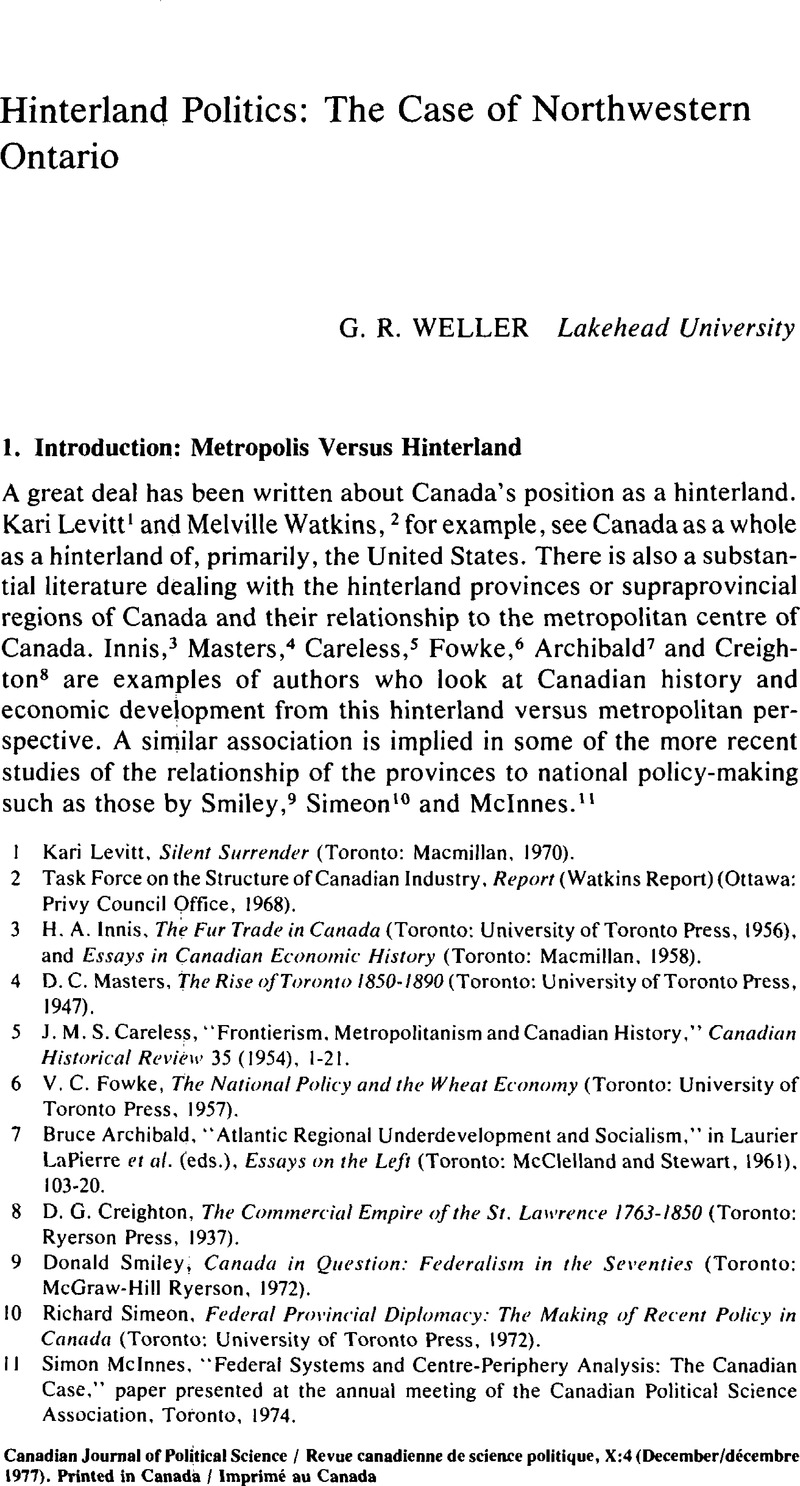Published online by Cambridge University Press: 10 November 2009

1 Levitt, Kari, Silent Surrender (Toronto: Macmillan, 1970).Google Scholar
2 Task Force on the Structure of Canadian Industry, Report (Watkins Report) (Ottawa: Privy Council Office, 1968).Google Scholar
3 Innis, H. A., The Fur Trade in Canada (Toronto: University of Toronto Press, 1956)Google Scholar, and Essays in Canadian Economic History (Toronto: Macmillan, 1958).
4 Masters, D. C., The Rise of Toronto 1850–1890 (Toronto: University of Toronto Press, 1947).Google Scholar
5 Careless, J. M. S., “Frontierism, Metropolitanism and Canadian History,” Canadian Historical Review 35 (1954), 1–21.CrossRefGoogle Scholar
6 Fowke, V. C., The National Policy and the Wheat Economy (Toronto: University of Toronto Press, 1957).Google Scholar
7 Archibald, Bruce, “Atlantic Regional Underdevelopment and Socialism,” in Lapierre, Laurieret al. (eds.), Essays on the Left (Toronto: McClelland and Stewart, 1961), 103–20.Google Scholar
8 Creighton, D. G., The Commercial Empire of the St. Lawrence 1763–1850 (Toronto: Ryerson Press, 1937).Google Scholar
9 Smiley, Donald, Canada in Question: Federalism in the Seventies (Toronto: McGraw-Hill Ryerson, 1972).Google Scholar
10 Simeon, Richard, Federal Provincial Diplomacy: The Making of Recent Policy in Canada (Toronto: University of Toronto Press, 1972).Google Scholar
11 McInnes, Simon, “Federal Systems and Centre-Periphery Analysis: The Canadian Case,” paper presented at the annual meeting of the Canadian Political Science Association, Toronto, 1974.Google Scholar
12 Scott, Don, “Northern Alienation,” in MacDonald, Donald C. (ed.), Government and Politics of Ontario (Toronto: Macmillan, 1975), 235–48.Google Scholar
13 O'Doherty, E. T., “Regional Differences in Party Support,” in Rowat, D. C. (ed.), Provincial Government and Politics: Comparative Essays (2nd ed.; Ottawa: Carleton University, 1973), 461–74.Google Scholar
14 Usher, P., “Hinterland Culture Shock,” Canadian Dimension 8 (1972), 26–31.Google Scholar
15 Cranston, Maurice. Freedom (New York: Basic Books, 1953).Google Scholar
16 Frank, A. G., Capitalism and Underdevelopment in Latin America (New York: Monthly Review Press. 1969).Google Scholar
17 See, for example, Warnock, J. W., “Metropolis-Hinterland: The Lost Theme in Canadian Letters,” Canadian Dimension 10 (1974), 42–45Google Scholar; Davis, A. K., “Canadian Society and History as Hinterland Versus Metropolis,” in Ossenberg, Richard J. (ed.), Canadian Society: Pluralism, Change and Conflict (Scarborough: Prentice-Hall, 1971)Google Scholar; and Archibald, “Atlantic Regional Underdevelopment.”
18 Interesting comparative information on Duluth can be obtained from Elazar, D. J., “Constitutional Change in a Long-Depressed Community: A Case Study of Duluth, Minnesota,” Journal of the Minnesota Academy of Science 33 (1965), 49–66.Google Scholar
19 Descriptions of the nature of these two industries are to be found in Ontario, , Strategic Land Use Plan, Background Information and Approach to Policy: Northwestern Ontario (Toronto: Ministry of Natural Resources, 1974).Google Scholar
20 Ibid., 53.
21 Ibid., 58.
22 This development may increase racial tensions which have been particularly acute in the Kenora area as is indicated by Jacobson's, Eleanor M.Bended Elbow (Kenora: Central Publications, 1974).Google Scholar
23 This phenomenon is referred to in Scott, “Northern Alienation,” 241.
24 Ibid., 237.
25 See Ministry of Transportation, An Investigation of Freight Rates and Related Problems: Northern Ontario (Toronto: Ontario Ministry of Transportation, March 1976)Google Scholar, for a discussion of the freight rate problem.
26 Acres Research and Planning Ltd., Mid-Canada Development Corridor: A Concept (Toronto: Acres Research and Planning Ltd., 1969).Google Scholar
27 Scott, “Northern Alienation,” 247.
28 Morrison, K. L., “The Businessman Voter in Thunder Bay: The Catalyst to the Federal-Provincial Voting Split?” this Journal 6 (1973), 219–29.Google Scholar
29 Ontario New Democratic Party, Some Aspects of Regional Development in Ontario (Toronto: Ontario NDP, 1975), 7.Google Scholar
30 Criticism of the DREE grants can be found in Ontario Economic Council, Northern Ontario Development: Issues and Alternatives (Toronto: Ontario Economic Council, 1976)Google Scholar, chap. 4.
31 Ontario, , Design for Development: Northwestern Ontario Region, Phase 2: Policy Recommendations (Toronto: Department of Treasury and Economics, 1970)Google Scholar, and Design for Development, Ontario's Future: Trends and Options (Toronto: Ministry of Treasury, Economics and Intergovernmental Affairs, March 1976).
32 See Rasporich, A. W., “A Boston Yankee in Prince Arthur's Landing: C. D. Howe and His Constituency,” Canada: An Historical Magazine 1 (1973), 21–40.Google Scholar
33 Kornhauser, William, The Politics of Mass Society (New York: Free Press, 1961).Google Scholar
34 The roots of which are described by Morrison, Jean F., “Community and Conflict: A Study of the Working Class and Its Relationships at the Canadian Lakehead 1903–1913,” M.A. thesis, Lakehead University, 1974.Google Scholar
35 Rasporich, A. W., “Factionalism and Class in Modern Lakehead Politics,” Lakehead University Review 7 (1974), 31–65.Google Scholar
36 Ibid., 65.
37 Rohmer, Richard, The Green North: Mid-Canada (Toronto: Maclean-Hunter, 1970).Google Scholar
38 Acres Research and Planning Ltd., Mid-Canada Development Corridor.
39 See Mid-Canada Development Foundation, Essays on Mid-Canada (Toronto: Maclean-Hunter, 1970)Google Scholar, and Mid-Canada Report (Toronto: Mid-Canada Development Foundation, 1971).
40 Rohmer, Richard, Ultimatum (Toronto: Clarke Irwin, 1973)Google Scholar; Exxoneration (Toronto: McClelland and Stewart, 1974); The Arctic Imperative (Toronto: McClelland and Stewart, 1973); and even Exodus/UK (Toronto: McClelland and Stewart, 1975).
41 See Dam the Dams Campaign, The Water Plot (Thunder Bay: Dam the Dams Campaign, 1972).Google Scholar
42 Arthur, M. E., “Interurban Rivalry in Port Arthur and Fort William, 1870–1907,” paper presented to the Western Canada Studies Conference, Calgary, 1974, 2.Google Scholar
43 See Arthur, M. E., “The Landing and the Plot,” Lakehead University Review I (1968), 1–17.Google Scholar
44 Arthur, “Interurban Rivalry,” 16.
45 Scott, “Northern Alienation,” 242.
46 O'Brien, A., “Father Knows Best: A Look at the Provincial-Municipal Relationships in Ontario,” in MacDonald, Donald C. (ed.), Government and Politics of Ontario (Toronto: Macmillan, 1975), 154–71.Google Scholar
47 Ontario Economic Council, Northern Ontario Development, Issues and Alternatives (Toronto: Ontario Economic Council, 1976), 21.Google Scholar